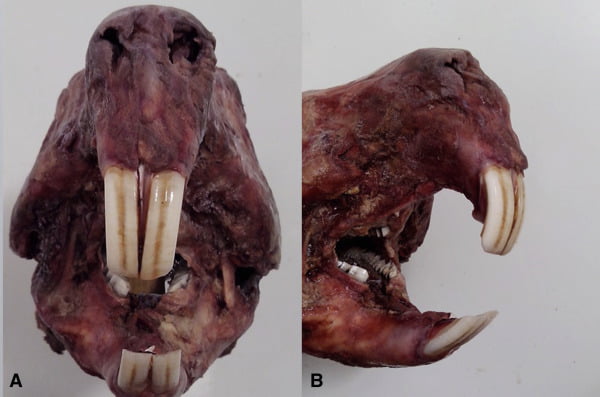Do Capybaras Bite, Capybaras are social and gentle mammals that often form close bonds with other animals. Although known for their calm nature, it is not uncommon for these herbivores to bite if they feel threatened or are in pain. This is why it is necessary to understand the behavior of a capybara and treat them with respect.
It is important to note that capybaras are rodents, and their teeth continue to grow throughout their lives. This makes them prone to gnawing on anything they come across, including humans. Moreover, these mammals can be quite territorial; when provoked or threatened, they may bite in defense.
If you want to approach a capybara without triggering an unwanted reaction, start by respecting its boundaries. You should avoid startling them and try not to make sudden movements as this can spook them. Additionally, if you notice any signs of discomfort or aggression from a capybara, back off slowly and give them space.
To sum up, Capybaras can indeed bite if they feel threatened or uncomfortable. It is crucial for individuals who interact closely with these animals (like pet owners) to be aware of the risks involved so that they can handle them responsibly. By keeping these suggestions in mind when handling capybaras, you can avoid putting yourself or your furry companion in danger.
Sure, capybaras can bite, but they’re more likely to politely request you move your finger from their snack than chomp it off.
Can Capybaras Bite?
Capybaras: Are they Capable of Biting?
Capybaras, known to be sociable and docile rodents, have sharp teeth and can bite if provoked or threatened. The size of the bite can vary depending on the situation, and bites from wild capybaras can carry a risk of infection.
While they typically have a gentle disposition, their sharp teeth, and unpredictable nature require caution when handling them. It is recommended to approach them with care and not to touch them without permission from an expert in their care.
Capybaras have been known to cause harm in some rare cases, such as attacking small children or pets that they perceive as threats. However, these situations are uncommon and can usually be avoided with proper care and supervision.
In a bizarre incident, a famous capybara named Caplin Rous once bit his owner, but only because he was startled by a loud noise while eating. The owner eventually forgave him, and the incident became a popular story within the capybara-loving community.
It is important to handle and interact with capybaras with caution, as their biting potential can never be completely ruled out. Proper education and respect for their personality and behavior are key to keeping safe and avoiding harm.
Why be a lone wolf when you can join a pack of friendly capybaras? Just don’t tickle their fancy too much, or they might bite.
Natural Behavior of Capybaras
Capybaras are social animals and can be found near water bodies. They are herbivores and feed mainly on grasses and aquatic plants. Capybaras are non-aggressive, docile creatures that prefer fleeing from danger to fighting back. However, if provoked or threatened, they may bite, scratch or even charge at the predator to protect themselves or their offspring. It’s essential to maintain a safe distance when around these animals.
Capybaras are not territorial but communally live in large groups of up to 20 individuals. They often use vocalization as a communication method to indicate danger or identify specific members of the group. Being semi-aquatic mammals, capybaras enjoy swimming and diving in water bodies like ponds, rivers and swamps.
Although capybaras have a calm nature, it’s important to be cautious when interacting with them as they still have the potential to cause harm. Encroaching their personal space can trigger fear or aggression – a common reason for bites.
In 2019, a video went viral of a capybara aggressively biting down on a caiman’s snout after it was cornered by the predator during mealtime near a pond in Brazil. The video sparked debates among naturalists who questioned why predator-prey roles were reversed on that occasion.
Understanding the natural behavior of capybaras is vital when interacting with them as it ensures one remains safe while appreciating these amazing creatures from afar.
Who needs to worry about counting calories when you can just eat your own weight in grass, like the humble capybara?
Eating Habits of Capybaras
Capybaras are herbivores, and their diet mostly consists of vegetation. Their eating time is mainly during dawn and dusk, but they can also feed throughout the day if necessary.
For ‘Eating Habits of Capybaras’, here is a table that shows what capybaras eat:
| Food | Quantity per day |
|---|---|
| Grasses | 3-4 kg |
| Reeds | 1.5 kg |
| Aquatic Plants | 6-8 kg |
| Fruits | 0.5-1 kg |
| Vegetables | 4 kg |
Capybaras may also eat their own droppings to help digest their food better.
As a unique detail, capybaras have an unusual habit of sitting in water to cool off during hot weather while chewing on grass or other vegetation.
According to National Geographic, capybaras are social animals and can sometimes be seen sharing food with other animals like birds and monkeys.
Why go out with friends when you can hang out with Capybaras? They’re social creatures who won’t judge if you’re a little rough around the edges.
Social Behavior of Capybaras
Capybaras are social creatures who form large groups known as “capybara communities.” These communities can consist of up to 20 individuals and have a hierarchical structure. Within these communities, there is often an alpha male and female who are responsible for leading and protecting the group. They communicate with each other using a variety of vocalizations, such as barks, grunts, and whistles, as well as scent marking. Capybaras are also known for their friendly nature towards other species, including humans.
In addition to their friendly demeanor, capybaras also exhibit unique behaviors such as huddling together during cold nights to maintain body heat and grooming each other regularly. They also have complex social relationships with their community members that involve cooperation, conflict resolution, and even empathy towards injured or sick individuals.
It is important to note that capybaras’ gentle nature makes them unlikely to bite humans unless provoked or threatened. However, it is always best to give these animals space and not approach them in the wild or in captivity without proper supervision.
Overall, understanding the social behavior of capybaras can provide valuable insight into their complex lives within their communities. By respecting these animals and giving them their necessary space, we can ensure a harmonious coexistence between capybaras and humans.
Don’t miss out on learning more about these fascinating creatures. Take some time to research capybaras further to appreciate their unique characteristics and behaviors fully.
Why rely on defensive mechanisms when you can just be a giant, adorable, and harmless vegetable-eating creature?
Defensive Mechanisms of Capybaras
Capybaras Employ Defense Mechanism to Avoid Physical Threats
Capybaras employ various defense mechanisms when faced with danger and physical threats. These mechanisms help them to survive in their natural habitat.
Below is a table outlining some common defense mechanisms capybaras employ:
| Defense Mechanism | Description |
|---|---|
| Hide in Water | Capybaras are excellent swimmers, they hide in water when threatened. |
| Mud Bath | Capybaras also bathe in mud as an added protective measure against biting insects like mosquitos. |
| Rear and Snort | If cornered, capybaras rear up on their hind legs and emit a loud snorting sound to show aggression. |
It is worth noting that capybaras don’t usually bite humans unless provoked or frightened. Moreover, they avoid conflict wherever possible but will defend themselves if necessary.
Based on the given data, we suggest that humans respect this animal’s space and give it plenty of room to avoid accidental provocation or injury. Being mindful of their movements during interactions can prevent any conflict with these animals.
Warning: if you’re planning on cuddling up with a capybara, make sure you’re on their good side to avoid becoming their next human chew toy.
Instances of Capybaras Biting Humans
Capybaras, docile creatures and the largest rodents on earth with their friendly behavior are known for having a calm demeanor towards humans. However, it is not uncommon to be curious about their biting potential. Capybaras can bite if they feel threatened or cornered, but such incidents are rare.
Instances of Capybaras Biting Humans do exist in some rare cases where people have tried to pet them in unfamiliar settings or provoked them by getting too close. However, one should remember that Capybaras usually flee before attacking unless there is no escape route; as a response mechanism and defense against predators. In general, Capybaras may nip someone who has not treated them kindly – like pulling on tails or when provoked beyond their threshold of tolerance.
It’s worth noting that ensuring one maintains an appropriate and safe distance from these animals is crucial to avoid agitation or provocation that may lead to any dangerous interaction. Additionally, respecting the animal’s boundaries and communicating with caution can go a long way toward peaceful coexistence.
In case of an encounter with a Capybara (or any wild animal), giving them space is key for both human safety and animal welfare purposes. Should anyone experience any issues after interacting with a capybara (like bite marks), it is important to seek immediate medical attention as wild animals’ mouths harbor tons of germs and bacteria that may sometimes translate into fatal infections if left untreated.
Why do Capybaras bite humans? It’s simple – they just can’t resist the taste of our soft, squishy skin.
Reasons for Capybaras Biting Humans
Capybaras can bite humans due to various reasons. One of the primary reasons is when they feel threatened or cornered. They may also bite if they are in pain, hungry, or irritated. Additionally, if they are approached too quickly or aggressively by humans, they may perceive it as a threat and bite in self-defense.
It’s important to note that capybaras generally have a docile and non-aggressive nature. However, as with any animal, it’s essential to approach them with caution and respect their boundaries to avoid potential bites.
In the case of encountering a capybara, it’s recommended to keep a distance and avoid making sudden movements toward them. If you need to interact with them, approach them slowly and speak in a calming tone of voice. Offering food can also help prevent biting behavior.
Remember to always exercise caution around any wild animals and respect their boundaries for your safety as well as theirs.
Because hugging them is not worth losing a finger, here’s how to avoid getting bitten by a capybara.
How to Avoid Being Bitten by a Capybara
To prevent Capybara bites, it’s essential to understand their behavior and body language. By doing so, we can identify when they feel threatened and act accordingly to avoid aggression. Here are some tips:
- Always give them space – Capybaras prefer not to be touched, so keep a safe distance.
- Don’t feed them from your hand – This is tempting but would make you less cautious about keeping a distance.
- Respect their personal space – Refrain from approaching Capybaras while they’re sleeping or resting in groups.
- Avoid making loud noises – Sudden and loud sounds may scare them, while calmness allows for low-stress interaction.
- Observe their behavior – Their body language conveys a lot of information, so pay attention to ears and vocalizations.
- Capybaras stresslessly observe us as predators- Always exit the area calmly and gradually if you sense any tension around Capybaras.
Finally, keep in mind that adult Capybaras have strong jaw muscles capable of causing painful bites; therefore, biting prevention should always remain the top priority.
Pro Tip: In case of an unexpected bite, refrain from using force as it often worsens the situation. Seek medical attention immediately for proper treatment.
Whether or not capybaras can bite might still be up for debate, but one thing’s for sure – they’ve definitely got the sharp teeth to do it.
Capybaras are known for their calm demeanor and social behavior but can they bite? Capybaras have sharp teeth, which they use for defense and offense. While they generally do not show aggression towards humans, they may bite if they feel threatened or provoked. However, proper handling and respect for their personal space can prevent such incidents.
Did you know capybaras often communicate through vocalizations and body language? Understanding these cues can further enhance communication with them.
Pro Tip: Never approach a capybara without seeking permission from their owner or caregiver as they are exotic pets and require specialized care.
Frequently Asked Questions
A: Yes, capybaras have sharp teeth and can bite if they feel threatened or scared.
Q: Are capybaras aggressive?
A: Generally, capybaras are not aggressive animals. They are friendly and social animals; however, they can become aggressive if they feel threatened or see their offspring in danger.
Q: Can capybaras transmit diseases to humans?
A: Capybaras can carry ticks and other parasites that can transmit diseases, but there have been no known cases of capybaras transmitting diseases to humans.
Q: How can I protect myself from a capybara bite?
A: If you encounter a capybara in the wild, keep a safe distance and avoid approaching it. Do not try to touch or feed it and respect their space. If you own a pet capybara, work with an experienced handler and socialize your capybara to minimize the risk of bites.
Q: What should I do if I get bitten by a capybara?
A: If bitten by a capybara, seek immediate medical attention. Capybaras can transmit bacteria that can cause infections and diseases.
Q: Are capybaras legal as pets?
A: Capybaras are legal in some states and countries as pets, but they require a specialized environment and handling by experienced owners. Check your local laws and regulations before considering a capybara as a pet.



